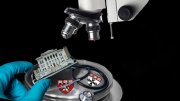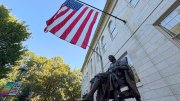Hours after the federal government froze $2.2 billion in research funding at Harvard, scientists across the University received sudden stop-work orders—halting projects on radiation exposure, ALS diagnostics, and tuberculosis treatment. The notices came less than a day after Harvard refused to comply with federal demands related to its internal governance. The stop-work orders are already reshaping University research: labs are scrambling to secure emergency funding, pausing work, and bracing for layoffs.
Among the first to be affected was Given professor of immunology and infectious diseases Sarah Fortune, who studies tuberculosis. She leads what she calls a “TB moonshot”—a $60-million National Institutes of Health-backed initiative involving Harvard and other institutions to understand immunity to tuberculosis, the world’s leading cause of death from a single infectious agent. “It’s unbelievable, this group of people that have come together to work on this problem,” Fortune said. But without funding, that work can’t continue.
The consequences for Fortune’s research are immediate. For example, if a trial for tuberculosis vaccine being tested on macaque monkeys cannot be completed, the monkeys might have to be euthanized. Since Harvard’s announcement, some private donations have come in, Fortune said, including one donor who specifically pledged to support the monkeys. But there are long-term consequences that donations—or the University’s endowment—cannot fix. “In some of these sites, people have to start laying people off now. That just does not come back,” she said. “If that expertise disappears, you can’t just rebuild it. It takes decades to build. It would take decades to rebuild.”
At the Wyss Institute for Biologically Inspired Engineering, founding director Donald Ingber’s team was also hit with a stop-work order. He had been conducting research using a suite of human organs-on-chips (microchips that provide insights into the structure and functions of organs such as lungs and hearts) to simulate radiation exposure—critical for cancer treatment, nuclear disaster preparedness, and space travel. The $20-million grant, funded by the Biomedical Advanced Research and Development Authority (BARDA), was suddenly frozen.
Ingber’s research, particularly in radiation countermeasures, has implications for many of the Trump administration’s stated goals, he says—from going to Mars to expanding nuclear reactors to supporting the artificial intelligence industry. “You’re never going to go to Mars unless you can mitigate the effects of radiation,” said Ingber, the Folkman professor of vascular biology at Harvard Medical School and professor of bioengineering at the School of Engineering and Applied Sciences. A related NASA-funded project on astronaut health and microgravity exposure is also now in jeopardy. Like Fortune, Ingber and his team are also seeking alternative support to avoid layoffs and continue their research.
Wyss professor of biologically inspired engineering David Walt, whose research seeks to develop a new diagnostic tool for ALS, also received a stop-work order. For him, time is especially critical: biological materials used in his experiments degrade quickly.
The cost of inaction extends beyond the stakes of their individual projects, the researchers say. “Without science, you don’t have technology. Without technology, you don’t have an economy,” said Ingber. “This is about economic leadership and competitiveness, which this nation and administration say they’re so worried about and so committed to advance.”









